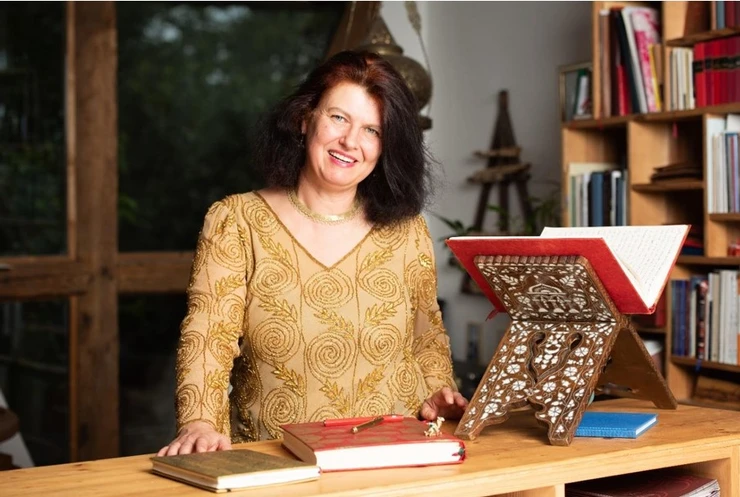
The Hakim epic and its Gotha manuscript
as part of the Gerda Henkel Foundation's Tandem Fellowship at the Gotha Research Centre
in collaboration with Professor Dr Amro Mounir
The Gotha Research Library is particularly richly endowed with manuscripts of the Arabic epic genre. Little is known about this literary genre (Arabic genre name: sīra šaˁbiyya) in research, although these are extensive and extremely popular books in Arabic reception. Mammoth works with up to 70, in one extreme individual case even 81 volumes per copy filled the bookcases of professional storytellers, who read serialised versions to their audiences. But such works, in which Arabic historiography found its popular, epic counterpart full of excitement and adventure, were also popular reading material for private readers for many centuries.
The oldest certificates of the existence of Arabic epics can be found in the 12th century; the oldest surviving manuscripts date from around 1400. They therefore date from the Mamluk period, were mostly written in Cairo, but circulated in all centres of the Arab countries and thus belonged to a similar era and environment as the earliest surviving manuscripts of the Thousand and One Nights. My dissertation Metamorphoses of the Epic (published in Lei den 2003) also deals with the sira šaˁbiyya text type; in it, manuscripts of a representative of the genre are appreciated and analysed in detail, including those from the Gotha Research Library.
The reason why the Gotha Research Library holds so many manuscripts from the world of Arabic epic poetry is that the explorer Ulrich Jasper Seetzen (1767-1811), from whose purchases in the Orient the first collection of the then ducal library was built up, was particularly interested in such texts - and had to be interested in them: the Arabic epics were closely related to the Thousand and One Nights, and manuscripts of the Thousand and One Nights were regarded as status symbols for European libraries in the 18th and 19th centuries.
The manuscript MS. Orient A 2599 is a fragment of such an epic manuscript. It belongs to the Hakim Epic (Sīrat al-Ḥākim bi-Amrillāh), one of the "slimmer" works of the genre with "only" 20 volumes. The epic is of Egyptian origin and is about the eccentric Caliph al-Ḥākim bi-Amrillāh (985-1021), the Fatimid Caliph of Cairo. With its monumental structure, historical and mythological themes, magical motifs and bloody battles, the Hakim epic is reminiscent of works of modern fantasy literature such as "The Lord of the Rings".
There is already some small-scale research on the Hakim epic (see below), but there is a lack of both an edition and a translation. I would like to address this desideratum in collaboration with my Egyptian colleague Dr Amru Munir, who is experienced in this field. A German translation of the Hakim epic based on several manuscripts is in progress; Dr Munir is working on a complete edition based on the same manuscripts.
Relevant preliminary work:
- Claudia Ott: "Where is al-Ḥākim hiding? A search for clues in the Sirat al-Hakim bi-Amrillah and its Berlin manuscript." In: Difference and Dynamics in Islam. Festschrift for Heinz Halm on his 70th birthday. Edited by Hinrich Biesterfeldt and Verena Klemm. Würzburg: Ergon publishing house 2012, 399-410.
- Claudia Ott: "Finally we know ... why, how, and where caliph al-Ḥākim disappeared! Sīrat al-Ḥākim bi-Amrillāh and its Berlin Manuscript". In: Fictionalising the Past: Historical Characters in Arabic Popular Epic. Workshop held at the Netherlands-Flemish Institute in Cairo, 28th/29th of November 2007 in Honor of Remke Kruk. Ed. by Sabine Dorpmüller. Orientalia Lovaniensia Analecta 206, Leuven - Paris - Walpole, MA 2011, 63 72.
- Claudia Ott: Metamorphoses of the epic. Sīrat al-Muǧāhidīn (al-Amīra Ḏāt al-Himma) between orality and writing. Leiden 2003 (CNWS , Vol. 119; Contributions by the Nederlands / Vlaams Instituut in Cairo, Vol. 6).
- Antje Lenora: The Forged Caliph - An Introduction to the Sīrat al-Ḥākim bi-Amrillāh. Theses of the University of Halle 2011, opendata.uni-halle.de/handle/1981185920/7772.
Most important publications:
- Tausendundeine Nacht. Nach der ältesten arabischen Handschrift in der Ausgabe von Muhsin Mahdi erstmals ins Deutsche übertragen von Claudia Ott. München: Verlag C.H.Beck 2004
- Tausendundeine Nacht. Das glückliche Ende. Nach der Handschrift der Rasit-Efendi-Bibliothek Kayseri erstmals ins Deutsche übertragen von Claudia Ott. München: Verlag C.H.Beck 2016
- Tausendundeine Nacht. Das Buch der Liebe. Nach den ältesten arabischen Handschriften erstmals ins Deutsche übertragen von Claudia Ott. München: Verlag C.H.Beck 2022
- 101 Nacht. Nach der andalusischen Handschrift des Aga Khan Museum erstmals ins Deutsche übertragen und umfassend kommentiert von Claudia Ott. Zürich: Manesse Verlag 2012
- Gold auf Lapislazuli. Die 100 schönsten Liebesgedichte des Orients. München: Verlag C.H.Beck, 2008
- Erste arabische Lesestücke. München: dtv 2017
- (Diss.:) Metamorphosen des Epos. Die Sirat al-Mujahidin (al-Amira Dhat al-Himma) zwischen Mündlichkeit und Schriftlichkeit. Cairo, Leiden: CNWS, 2003
Most important honours:
- Johann-Friedrich-Cotta-Literature-and-Translation Prize of the City of Stuttgart, 2011
- Nomination for the Leipzig Book Prize, category "Translation", 2013
- Culture Prize of the City of Erlangen, 2019
- Scholarship from the Jakob and Emma Windler Foundation Stein am Rhein, 2019
- MERCATOR Fellowship at the LMU Munich, 2023
- (with Amro Moneer): Gerda Henkel Tandem Fellowship at the Gotha Research Centre, 2024

